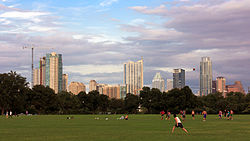Zilker Park
| Zilker Park | |
|---|---|
| Zilker Metropolitan Park | |
 Austin skyline from Zilker Park | |
 | |
| Area | 350 acres |
| Operated by | Austin Parks and Recreation Department |
Zilker Park Historic District | |
| Location | Austin, Texas |
| Coordinates | 30°15′49″N 97°46′36″W / 30.26361°N 97.77667°W |
| Built | 1917 |
| Architect | Charles H. Page, Fred A. Dale |
| Architectural style | Moderne |
| NRHP reference No. | 97000479[1] |
| Added to NRHP | May 23, 1997 |
Zilker Metropolitan Park is a recreational area in south Austin, Texas at the juncture of Barton Creek and the Colorado River that comprises over 350 acres (142 ha) of publicly owned land. It is named after its benefactor, Andrew Jackson Zilker, who donated the land to the city in 1917. The land was developed into a park during the Great Depression in the 1930s. Today the park serves as a hub for many recreational activities and the hike and bike trail around Lady Bird Lake, both of which run next to the park. The large size of the park makes it a capable venue for large-scale events such as the Austin City Limits Music Festival and the Zilker Park Kite Festival. The park was listed in the National Register of Historic Places in 1997.
History
The land surrounding Barton Springs was claimed by its namesake, William Barton, in the 1830s for his cattle ranch. In the 1860s it was acquired by the Rabb family, who operated mills on Barton Creek.[2] In the early twentieth century Andrew Jackson Zilker bought a 350-acre (140 ha) plot of land between the Colorado River and Barton Creek, including the Springs, and used the spring water in his ice-making business. Zilker sold his land to the City of Austin in a series of sales in 1917, 1923 and 1931; he donated the proceeds of the sale to a trust dedicated to funding Austin's public schools.[3][4]
In the 1930s the city transformed the ranch into a space for public recreation, building park amenities and buildings with help from the Civil Works Administration. Barton Springs Pool was given a concrete dam and an enlarged swimming area.[2] In 1934 the park was named Zilker Metropolitan Park, after its donor and patron.[3]
Attractions
In addition to general-purpose lawns, sports fields, cross country courses, historical markers, concession stands and picnic areas, the park includes numerous public attractions.[5] The Zilker Botanical Garden features several independently maintained gardens located near the center of the park and hosts the Zilker Gardens Festival every spring. The Austin Nature & Science Center offers ecological exhibits, nature hike trails, and children's educational programming. The Umlauf Sculpture Garden adjoins the southeast end of the park, displaying sculptural works by artist Charles Umlauf and others. The Zilker Hillside Theater hosts regular performances by local theatre companies, including free "Shakespeare in the Park" every May and an annual summer musical. Barton Springs Pool adjoins the park on the east, offering public swimming; other water activities are available in Barton Creek. The Beverly S. Sheffield Education Center by Barton Springs Pool offers exhibits about the natural history of the Edwards Aquifer that feeds Barton Springs. Every winter the 155-foot (47 m) Zilker Holiday Tree is illuminated, along with a Trail of Lights display. The Zilker Zephyr 12 in (305 mm) gauge miniature railway carries passengers on a tour around the park.[3]
The park's amenities and wide open spaces allow it to host a variety of large events each year. Most notably, the Austin City Limits Music Festival fills the park for two weekends each fall with numerous live musical performances by prominent artists.
Trails
- Roy and Ann Butler Trail encircling Lady Bird Lake
- Violet Crown Trail runs south from Barton Springs Pool to Lady Bird Johnson Wildflower Center
Gallery
-
East entrance
-
Pool entrance
-
Zilker Zephyr
-
Doug Blachly Butterfly Trail and Garden
-
Austin Nature Center
-
Winter canoeing on Barton Creek
-
Disc golf course
-
Old Mill Spring
-
Clubhouse
-
Ashford McGill House
-
Barton Creek bridge
-
Austin City Limits festival
-
Trail of Lights
References
- ^ "National Register Information System". National Register of Historic Places. National Park Service. April 15, 2008.
- ^ a b Psencik, Katey. "Zilker Park: 350 acres of land, centuries of history and culture". KVUE. Retrieved 22 May 2015.
- ^ a b c "Zilker Metropolitan Park". City of Austin. Retrieved 22 May 2015.
- ^ "Andrew Jackson Zilker". Austin Public Library. Retrieved 22 May 2015.
- ^ "Meets at this location". athletic.net. Retrieved 2018-09-15.
External links
- National Register of Historic Places in Austin, Texas
- Parks in Austin, Texas
- Cross country running courses in Texas
- Historic districts on the National Register of Historic Places in Texas
- Neighborhoods in Austin, Texas
- Parks on the National Register of Historic Places in Texas
- National Park Service rustic in Texas


















